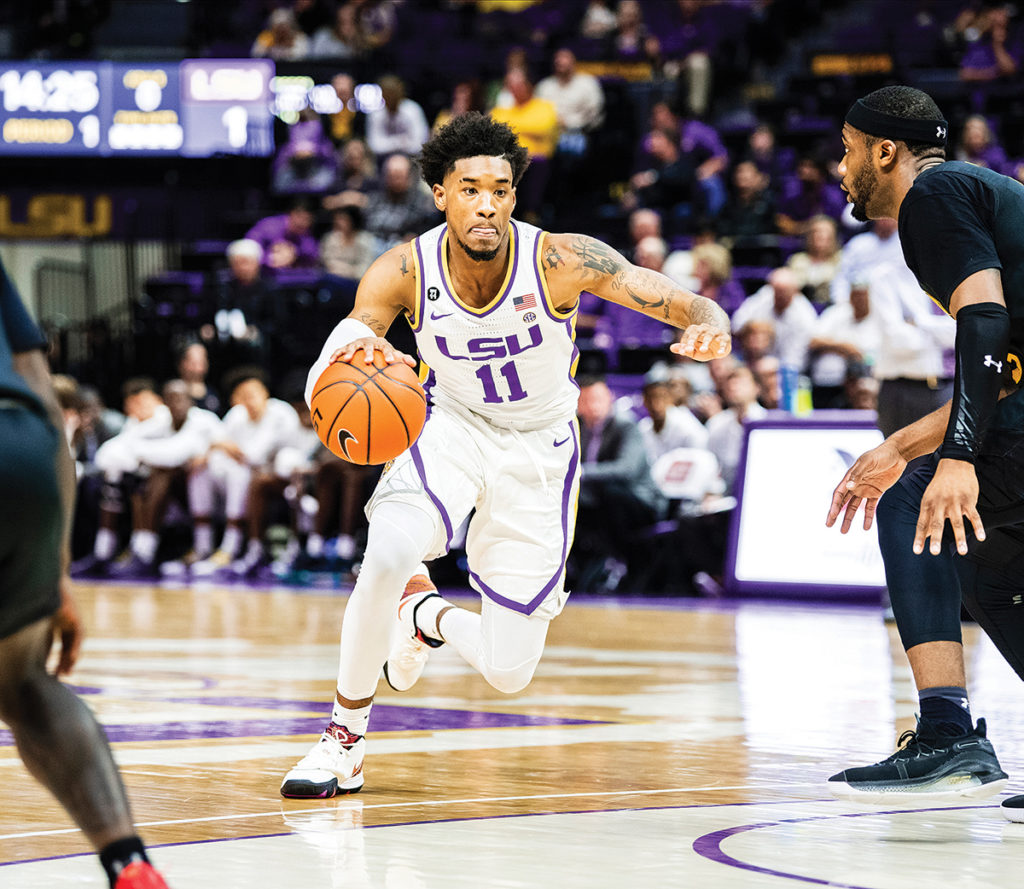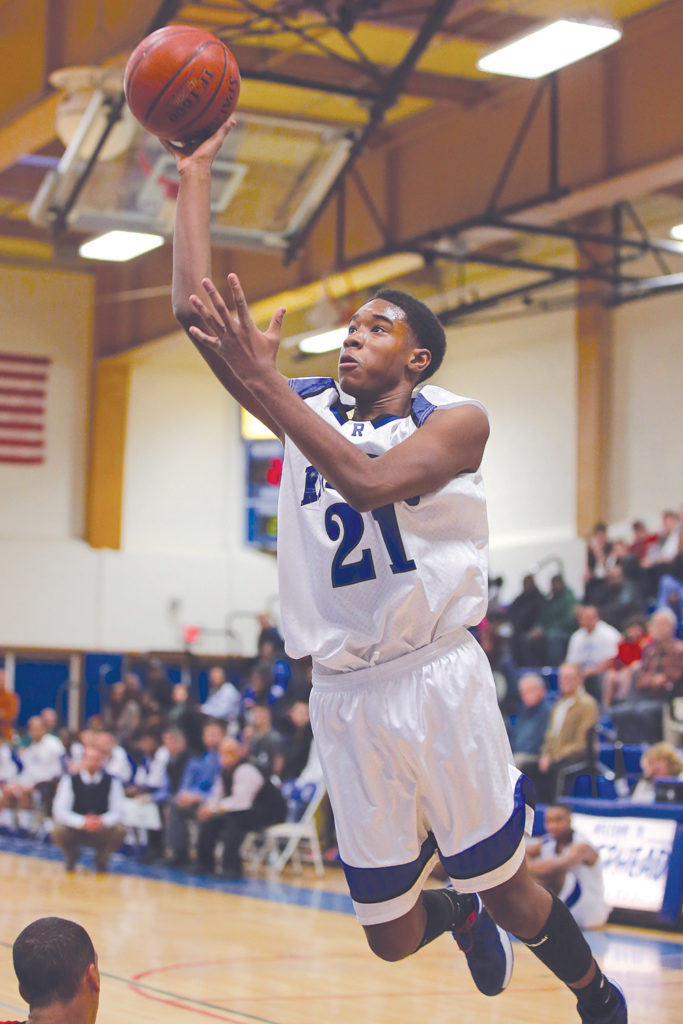Charles Manning’s long journey to LSU began in Riverhead

There was a time, in the early months of his senior year of high school, when Charles Manning was unhappy.
Monday through Friday, his alarm would go off around 5 a.m. While the teammates and friends with whom he’d won a Class D boys basketball state championship less than a year before were still asleep nearby in their Bridgehampton neighborhood, Charles’ father, Maurice, would drive him half an hour to Riverhead, where he’d take a long train ride to Wyandanch, followed by a 20-minute drive into Nassau County to get to Long Island Lutheran High School, a private school in Brookville.
Charles didn’t want to leave Bridgehampton. When he’d transferred from Riverhead High School to his father’s alma mater during his junior year, he was an instant star, making an already talented Killer Bees team dynamite — and making very real the possibility that Bridgehampton would win its ninth state title, and first since the three-peat of the late 1990s.
Maurice Manning had been the highly touted star of those championship teams and, as expected, Charles followed in his footsteps, scoring 31 points and earning MVP honors in a state title victory in 2015. Without any seniors, the Bridgehampton team was automatically the favorite to defend that title, a prospect that made finishing his high school career there extremely alluring.
But winning state titles wasn’t Charles’ ultimate goal. He made it clear to anyone who would listen that he wanted to play beyond high school, for a big-time college program and, one day, in the NBA — and he had proven he had the size and raw skills required to chase that dream. Even with those prerequisites, his father knew better than anyone just how hard that would be, how natural gifts are only part of the equation and how a dream can slip away in an instant if the right plan isn’t in place.
Maurice Manning knew this, of course, because it happened to him. He went away to prep school after graduating from Bridgehampton, a move that was supposed to be the first step toward stardom for one of the many Division I programs that recruited him after he’d won Suffolk County Player of the Year honors as a senior and was a three-time state tournament MVP. Instead, he returned home as a new father before the prep year was over and took a break from playing before leading Suffolk County Community College to back-to-back junior college championships in 2003 and 2004.
His became a story of promise largely unfulfilled. He did not want that to happen to his son.
So despite early objections, Charles grinded through the long hours on the train, splitting his time between his father’s place in Bridgehampton and the home of his mother, LaShanne Dozier, in Riverhead. He played well and improved at Lutheran, a highly competitive private school program. His success there led him to Combine Academy in North Carolina, a well-respected prep school, where he worked on his game for another year — taking advantage of the fact that he was young for his grade — before moving on to Florida Southwestern, where he was a junior college All-American as a sophomore and, at the time, the third-ranked prospect in the country. And after two seasons at Florida Southwestern, Charles at long last achieved his goal of playing for a big name Division I program, landing a scholarship to Louisiana State University, alma mater of NBA legends like Shaquille O’Neal and Pete Maravich.
In 16 games this season with the Tigers — who were 15-4 overall, 6-0 in the Southeastern Conference as of Monday — Charles has had an immediate impact as a junior, starting several games but primarily coming off the bench and providing a spark as a versatile sixth man. He has contributed on offense, but has proven himself invaluable as a lockdown defender, with the skill to guard nearly every position on the floor. He’s averaging eight points per game, with a field goal percentage over 50, and has scored in double figures five times. He’s also accrued 17 blocked shots and nine steals over the course of those games.

Now 21, he will be sidelined for the next two to three weeks after surgery to repair a broken bone in his foot, an injury he suffered Jan. 14 during an 89-85 overtime win at Texas A&M. He will return in time to help his team through the rest of the season, and can also take comfort in the fact that he has one more season of eligibility remaining in his collegiate career. More importantly, he has arrived at a place many talented players fail to reach, and is on the cusp of achieving the lofty goal he had firmly planted in his mind five years ago, thanks to the guidance of a father who knows more about that journey than most, and a mother who he says has been his most faithful supporter since day one. Charles is not the star of his team, as he was during his state championship season at Bridgehampton, but that’s OK with him.
“It’s something I’ve wanted to do for a while, and it’s just a blessing to contribute in any way I can,” he said in an interview just days before his surgery.
His talent was evident early on, according to his first varsity basketball coach, John Rossetti of Riverhead. Rossetti said he had his eyes on Charles when the star player was just a seventh-grader. He played on the junior varsity as a freshman, and arrived on the varsity team a year later, nearly half a foot taller.
“He was a late bloomer in terms of growth, but his basketball game was always superior,” Rossetti said. “He’s just a natural scorer. Whenever the ball was in his hand, he knew how to create.”

Rossetti said that while any coach would love to have a player of that caliber on his team for an entire high school career, he understood why Charles left for Bridgehampton, and added that the many transitions he made after that prepared him for success at LSU.
“He made the right steps, and things worked out the right way for him because of the guidance he had,” Rossetti said, giving credit to both parents. “They created the right path for him to not only be successful on the court but to get a degree as well.
“We hope he continues to develop, and maybe one day we’ll see him in the league,” Rossetti added.
By the time Charles arrived in Baton Rouge, the process of adjusting to a new home, new coach, teammates and system was a familiar dance. Before long, he found his niche, his versatility, allowing him to play both the small forward and shooting guard positions as a spark plug off the bench, averaging 24 minutes per game.
“The transition wasn’t too hard, but it was still something to get used to,” he said, pointing out that he was expected to spend more time in the gym and weight room working on strength and conditioning. Of course, the level of competition increased, which took some getting used to as well.
“Everyone is faster, more physical, and they’re smarter players, too,” he said. “Technically, a lot of them have been looked at already by the NBA.”
The combination of lessons his father carries with him from his own experience years ago, the consistent love and support from his mother, and his own unwavering desire to play at the highest level is what has enabled Charles to keep going.
“He wanted it so bad,” Ms. Dozier said, just days after she’d returned from her first trip to the school to see him play. “He just wanted to make everybody proud.”
Ms. Dozier is certainly proud, and says she is at times bowled over by just how well her son has done year after year. On a recent visit to LSU, she said he was proud to show her his spotless dorm room, even pulling open his dresser drawers to reveal all his clothes, neatly arranged and folded.
“A lot of it is maturity, because he’s just matured so much,” she said. “As far as his grades, I don’t even worry. He’s just handling it.”
Both Ms. Dozier and Mr. Manning are now sitting back and enjoying the ride, taking comfort in the fact that their son has arrived at the place he so greatly desired to be, and is well equipped to take the final steps toward his ultimate dream. When they can’t see him play live, they watch him on TV, an experience they both describe as “surreal.”
Ms. Dozier says her son will often tell her, “I’m doing it for you, Mom,” a sentiment she understands, but doesn’t want to be his primary driving force.
“I don’t want it to be too much pressure on him,” she said. “I want him to just have fun, play ball, and whatever comes from that is fine.”
Mr. Manning has taken the same approach, and said he is glad he followed his gut when it came to guiding his son in making the hard choices that led him to LSU, even when Charles struggled early on, and when others around him may have questioned those choices.
“Ultimately, I told him, ‘To me, you already made it,’ ” he said. “I told him, ‘I’m already happy. You did something that a lot of people would love to do. There’s no more pressure now. If you want to keep playing basketball, just continue to work hard, and you can make a living doing this. I don’t have any more expectations. Whatever you put on yourself, I’m right there with you.’ ”
Cailin Riley is a freelance writer. A version of this article originally appeared in The Southampton Press.








